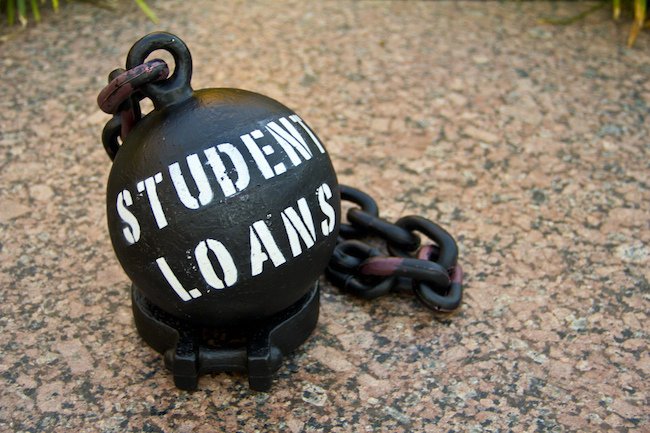
Sarah Dieffenbacher is on a debt strike. She’s refusing to make payments on the more than $100,000 in federal and private loans she says she owes for studies at a for-profit college that she now considers so worthless she doesn’t include it on her resume.
The “debt strike” sentiment is catching on. [source of quotes: Associated Press and foxnews.com 3/31/15]
Properly understood, a “strike” refers to a stance one takes in order to demonstrate that one’s work or efforts are not public property — i.e., that they belong to the person doing them, not anyone else.
In emotional terms a strike conveys the idea, “I don’t have to do this. And under the wrong conditions, I will not do it.”
A striker, in this sense, feels entitled to ownership over his or her own mind and efforts; not over the mind or efforts of another, or others.
The strike against student loan repayment is different. It represents a strike against the idea that there are no guarantees. “I chose to believe other people who told me I would have a certain-paying job upon graduation. It turns out that was mistaken. In order to punish those people, I refuse to repay my loan.”
What about the private companies who will not be repaid these loans? Do the stockholders and employees in those banks have the same rights, or fewer or different rights, from the loan-striking former student? Is it OK for Sarah Dieffenbacher, as a matter or “principle,” to refuse to pay back her student loan, while an employee at the bank who will be laid off cannot ever hope to send his or her child to college? Why is it fair and principled in one case, as many will claim, while it’s not fair in another?
It’s so easy to be angry, and to obtain the sympathy and agreement of unthinking others, without having to account for all the facts, isn’t it?
Of course, the student loan program provides a guaranteed student loan. Like the federally managed housing program (particularly right before the bust), a citizen is essentially guaranteed a loan regardless of any other factor. That’s why the government steps in, in the first place. A solely private lending market might take into account various factors — past history, intelligence, ability to pay off the loan in the future — as a means of rejecting some loan applicants while accepting others.
This, to the government and the politicians who fund it, is discrimination. Discrimination, to such a mindset, is absolutely and always wrong. Hence, government steps in and guarantees that essentially every student will obtain a loan for school. It creates a tuition bubble, just like the housing bubble and the medical cost bubble. All are government creations.
In such a context, is it any wonder the graduating student now says, “Hey, I was guaranteed a loan and was supposed to be guaranteed a good job upon graduation. I didn’t get one. So the hell with the loan. I’m not paying it back.”
The politicians, after all, have told her: “You have a right to college. You are entitled to a higher education and all the benefits that go with it.” She’s not getting that high-paying job. Perhaps in a free market economy, which would be closer to 6 or 8 percent growth than our lackluster, almost stagnating economy, she’d fare better? I’ll bet you money she voted for Obama (not that we had a compelling choice.)
Entitlement to the unearned breeds, not surprisingly, a sense of even more entitlement to even more of the unearned.
Of course, to be fully fair, the market for college education and tuition is grossly inflated. People are right to ask, “What the heck gives here?” Normally when prices of some good or service escalate in the way college tuition has escalated, one would conclude, “There’s not enough supply to meet the demand.” Those seeking to earn profits will enter the market and in the process increase the supply. That’s how basic economics works, whether it’s in education or anywhere else.
However, the government has subverted the private education marketplace. It has artificially created demand that would not otherwise exist by essentially providing a guarantee that everyone will get into college. From a college’s perspective, “Wow. We have more or less a continuous, guaranteed influx of students, no matter what.” This factor tends to raise costs, not decrease or stabilize them. It would with any business or enterprise.
But neither government nor colleges will get the blame. Instead, the rising cost of tuition is treated as some kind of a natural disaster, for which government, of course, must come to the rescue.
How? By providing more guaranteed loans? That didn’t work. By providing free college education for all, and excusing away many of those loan debts? Obama is working on it. If he doesn’t get what he wants from Congress, he’ll probably just issue executive orders. These loan debt strikers have a listening ear in Obama, as well as any other politician seeking to establish yet another victim group upon which to base personal power.
This will all have the effect of making college a meaningless exercise run by hacks who are propped up by a guaranteed source of income created by the government. (You know, kind of like public education at the elementary and secondary levels.)
In other words, government-subsidized college education is doing to higher education what it does to absolutely everything else it touches: Renders it essentially worthless.
Be sure to “friend” Dr. Hurd on Facebook. Search under “Michael Hurd” (Rehoboth Beach DE). Get up-to-the-minute postings, recommended articles and links, and engage in back-and-forth discussion with Dr. Hurd on topics of interest. Also follow Dr. Hurd on Twitter at @MichaelJHurd1
